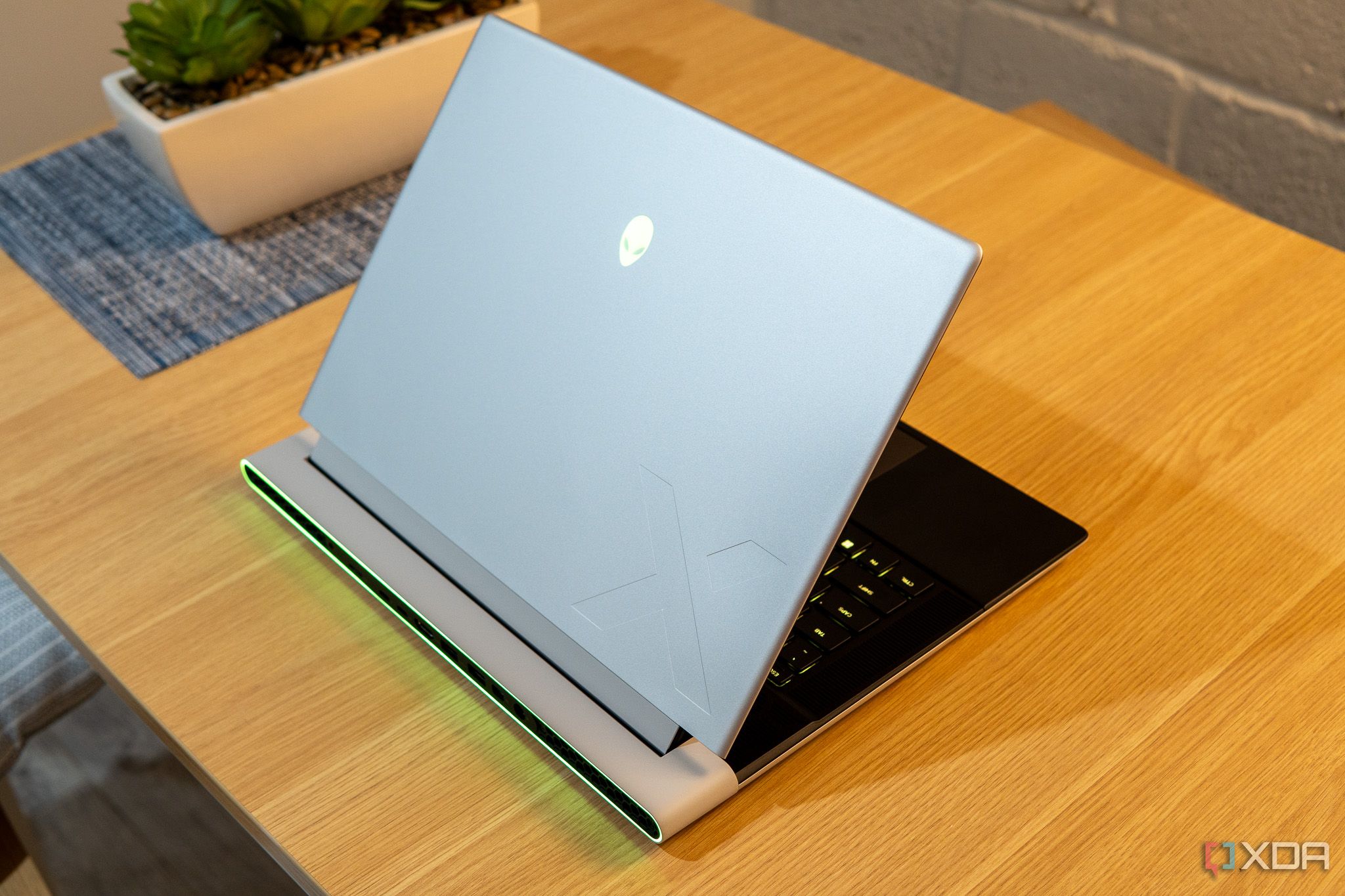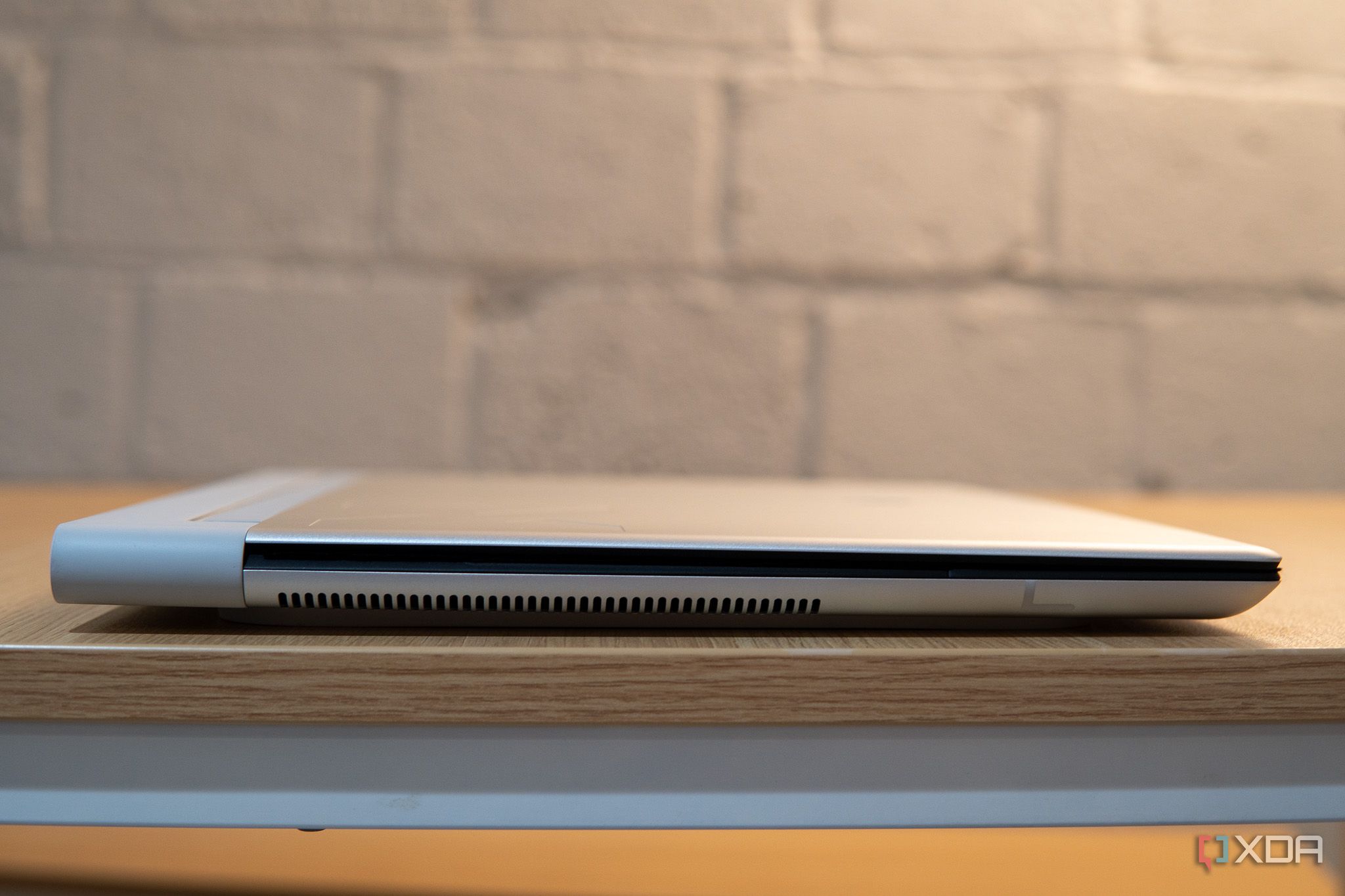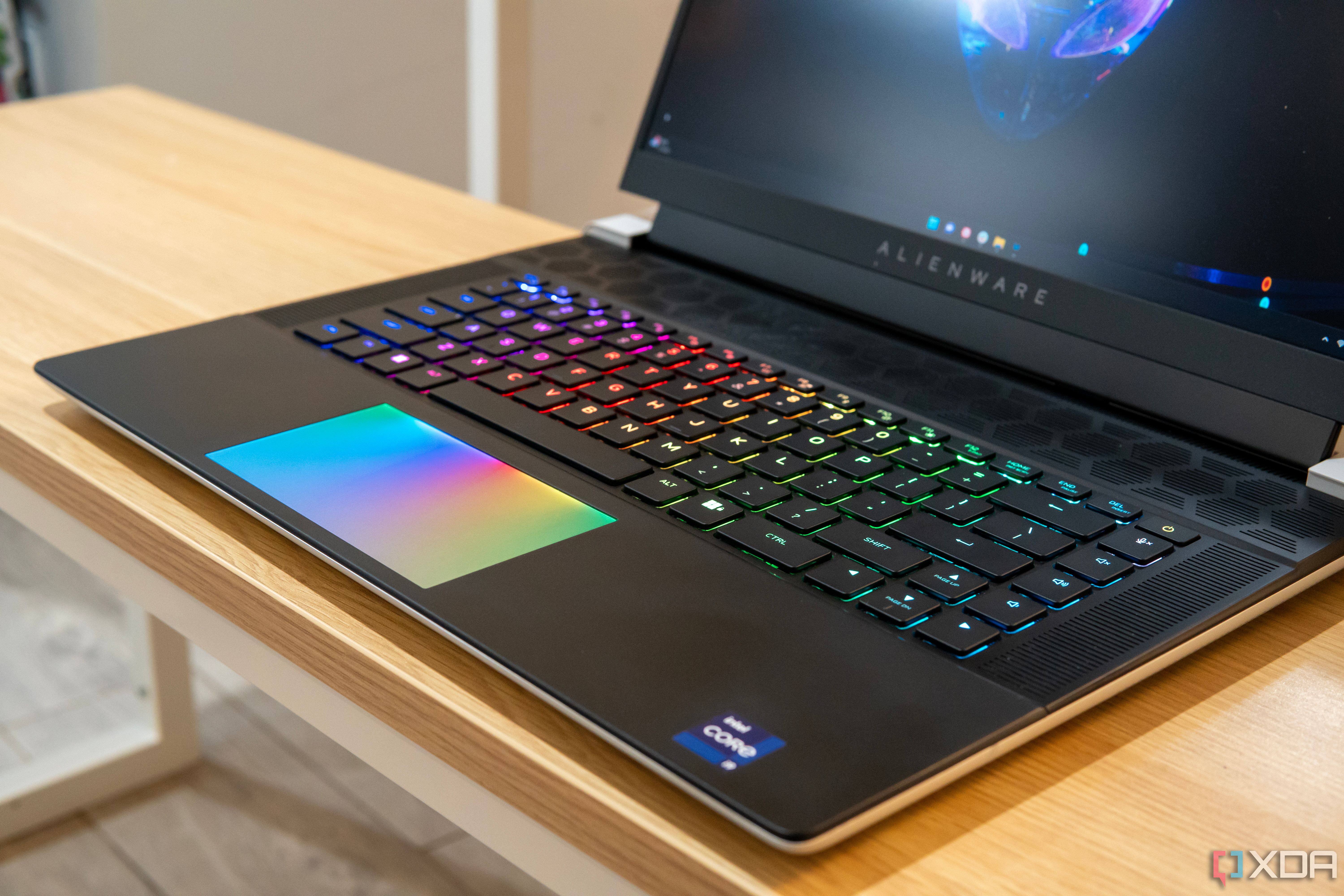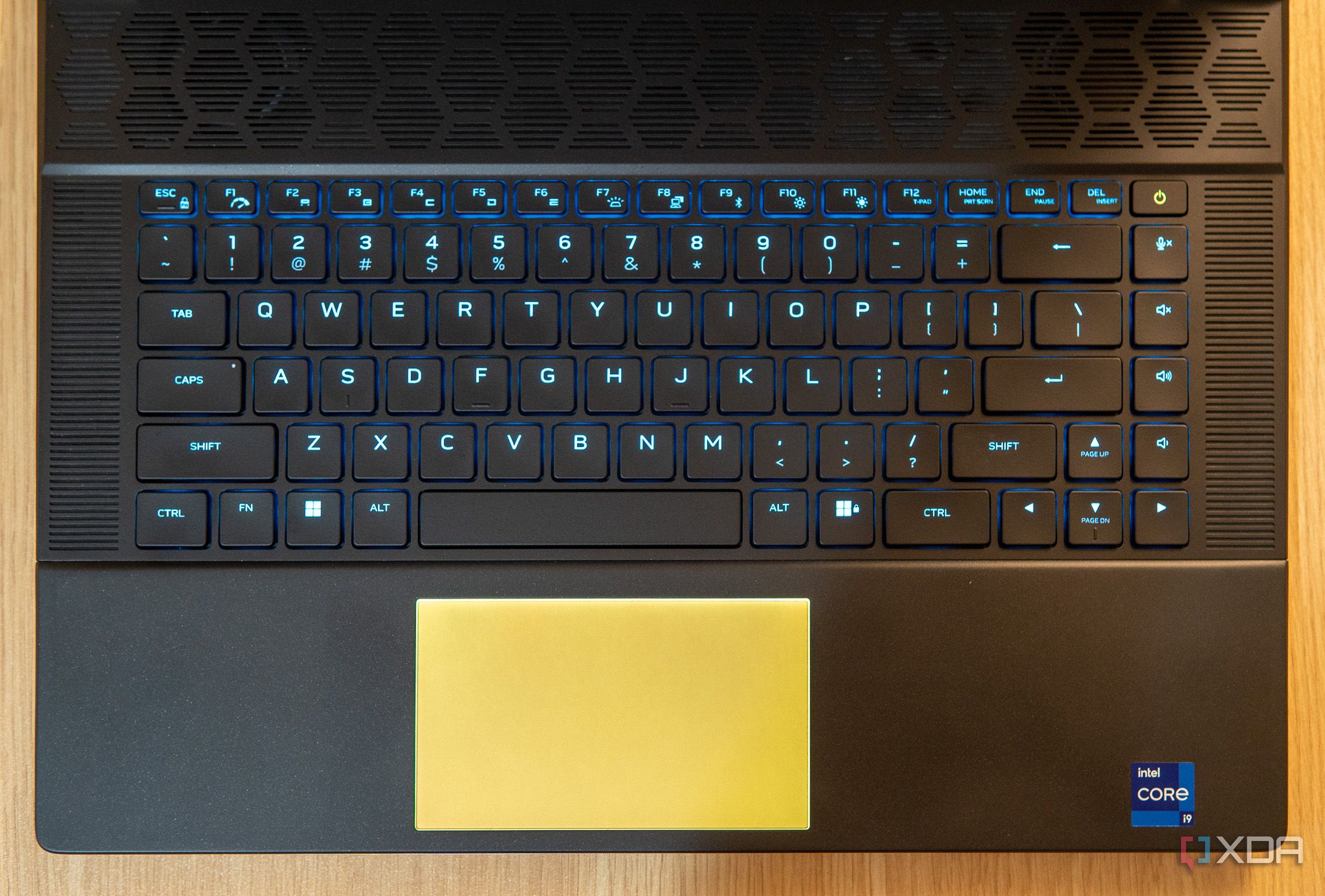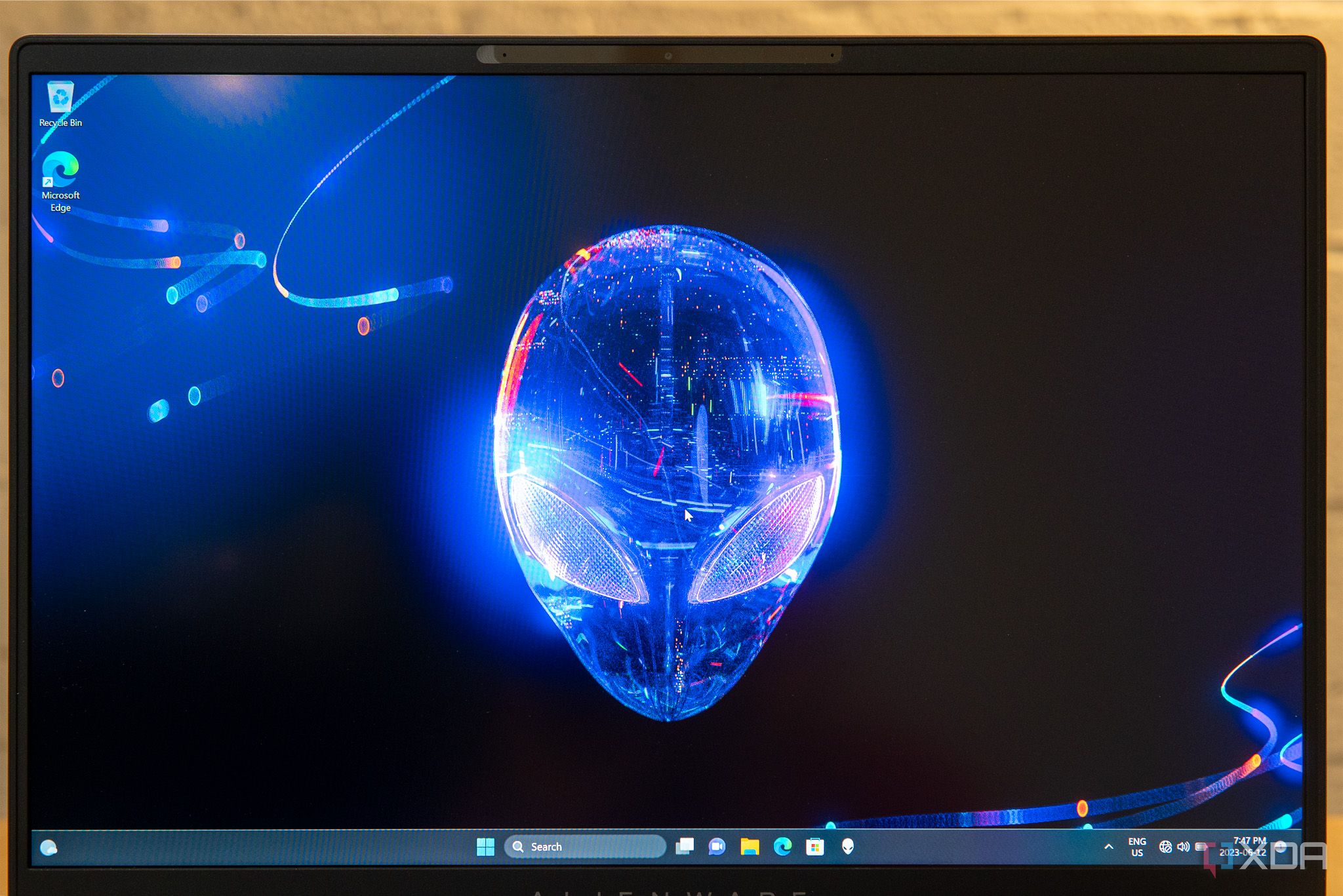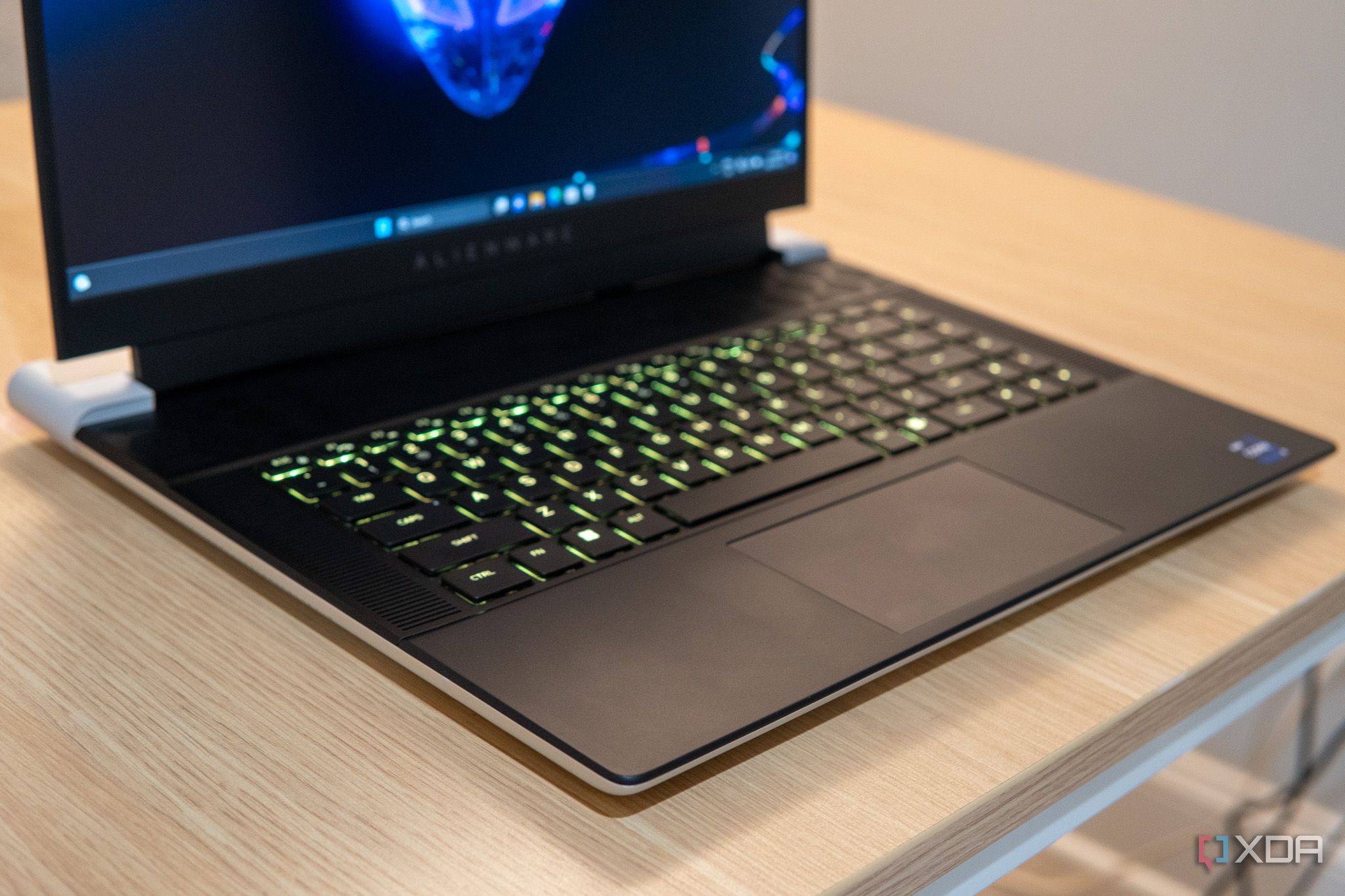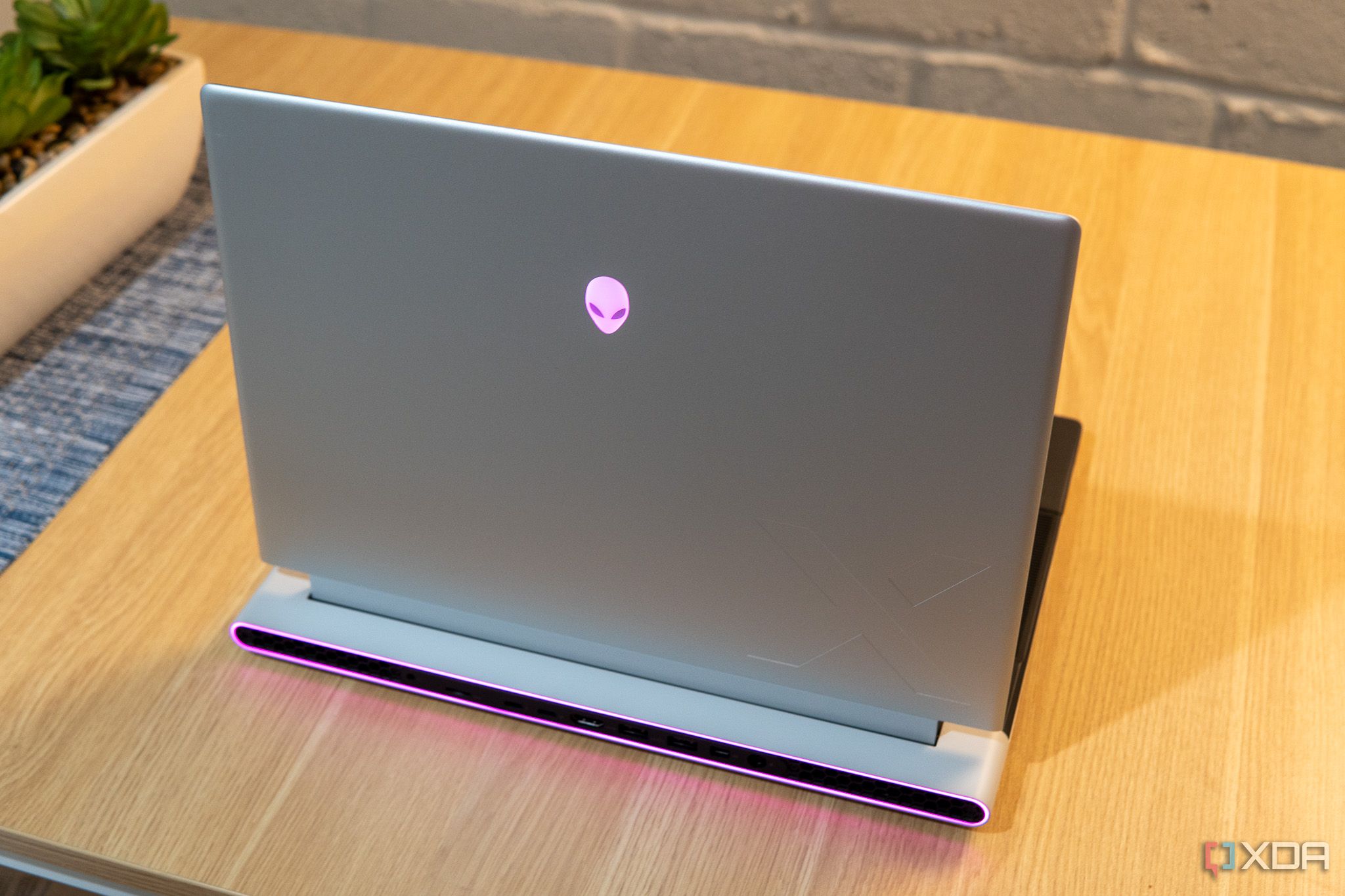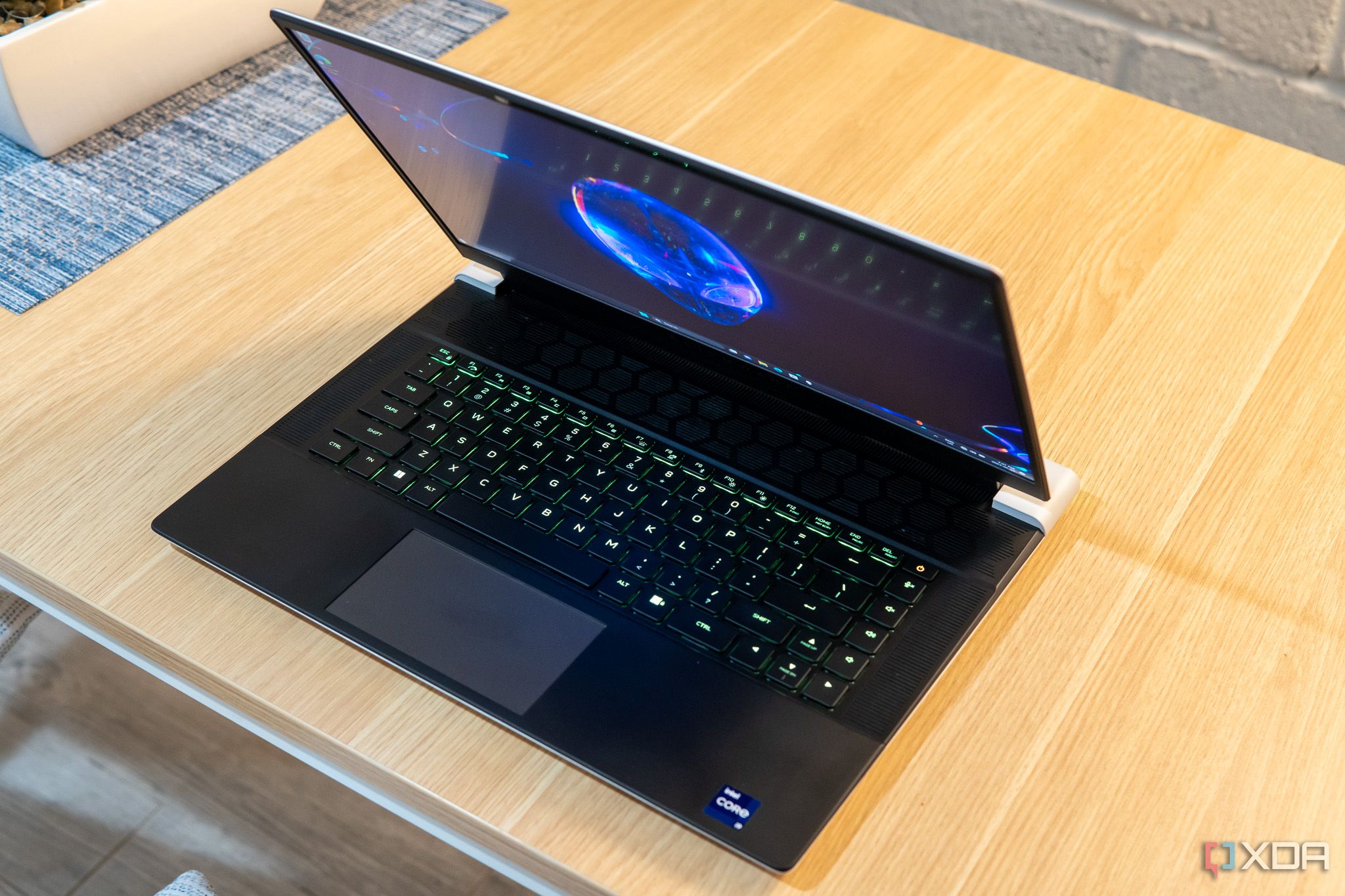Quick Links
Alienware is one of the biggest brands when it comes to gaming laptops (and desktops), and for good reason. The brand, owned by Dell, has built up quite a reputation for delivering powerful performance and featuring an instantly recognizable design language. Although, Alienware laptops, like many gaming laptops, are known for being unwieldy. The Alienware X series in 2023 is meant to take things even further by packing powerful performance into a more compact chassis.
The Alienware x16 is one of the latest additions to the series, combining that powerful performance and compact design with the current trend of larger, 16:10 screens for gaming laptops, and it delivers. The model I reviewed comes with a high-end CPU and GPU, and it can handle just about any modern game you could want to play beautifully. I also love how the laptop looks, combining a silver exterior with a black interior and a ton of RGB lighting that might actually be too much for some people.
Like most gaming laptops, battery life is a notable downside, but it's also not as bad as it could be. It's also still pretty heavy, though you have to expect that from a gaming laptop.
About this review: Dell sent us the Alienware x16 for the purposes of the review. The company did not have any input in its contents.
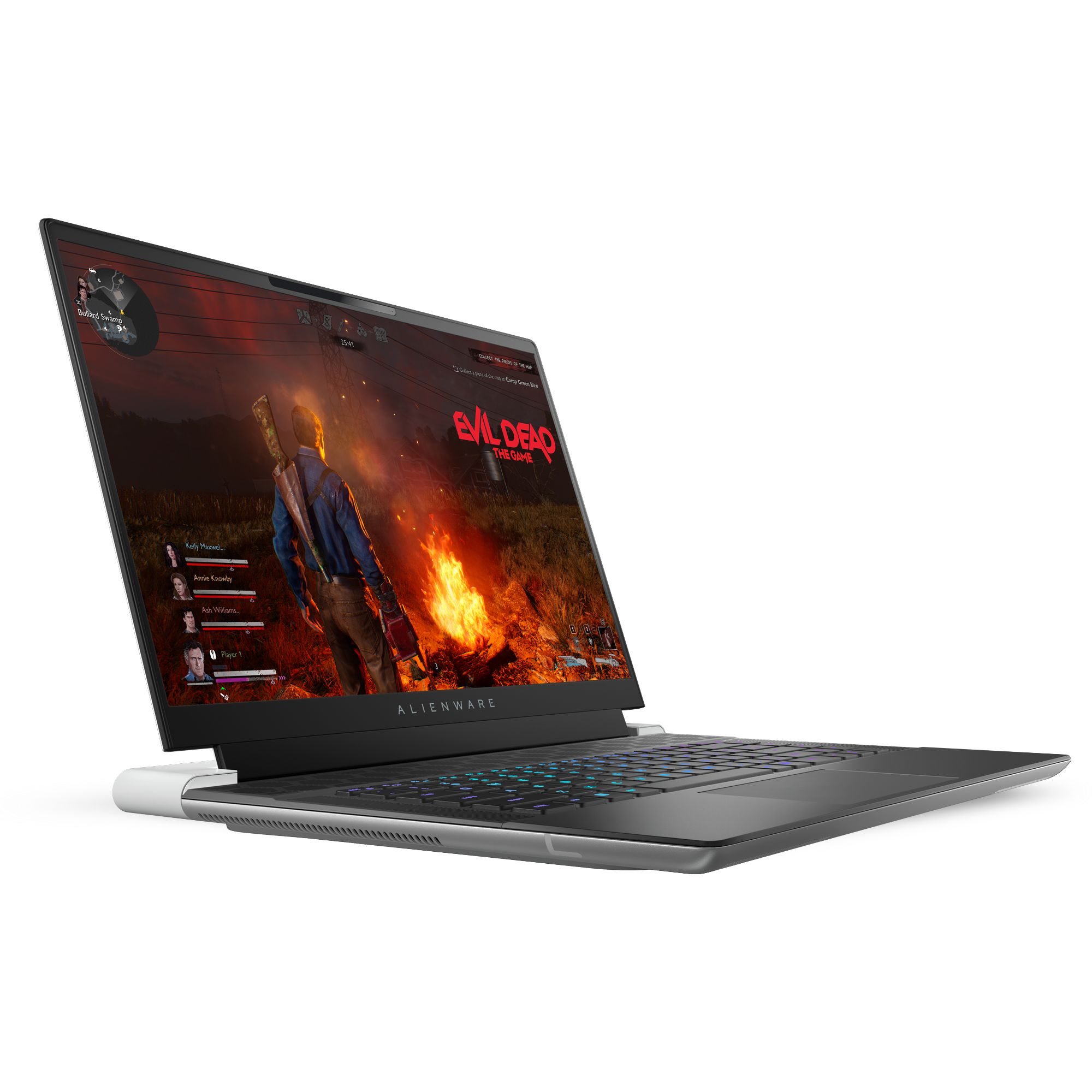

Alienware x16
The Alienware x16 is a powerful gaming laptop with a large 16-inch display and a 16:10 aspect ratio. It has 13th-generation Intel processors and Nvidia GeForce RTX 40 series graphics packed into a compact chassis.
- Brand
- Alienware
- Color
- Lunar Silver
- Storage
- Up to 4TB SSD
- CPU
- Up to Intel Core i9-13900HK, 14 cores, 20 threads
- Memory
- Up to 32GB RAM
- Operating System
- Windows 11
- Battery
- 90Wh
- Ports
- 1x Thunderbolt 4, 1x USB-C 3.2 Gen 2, 2x USB Type-A 3.2 Gen 2, 1x HDMI, 1x mini-DisplayPort, 3.5mm headphone jack, 1x microSD card reader
- Camera
- Full HD 1080p 30FPS webcam with IR facial recognition
- Display (Size, Resolution)
- 16-inch IPS, 2560x1600, 240Hz refresh rate, 100% DCI-P3, up 300 nits
- Weight
- Up to 6 pounds (2.72kg)
- GPU
- Up to Nvidia GeForce RTX 4090 Laptop
- Dimension
- 14.36x11.41x0.73 inches (364.81x289.98x18.57mm)
- Network
- Up to Intel Killer Wi-Fi 6E 1690i + Bluetooth 5.3
- Speakers
- Six speaker setup (2x 2W tweeters, 4x 3W woofers)
- Price
- Starting at $2,099.99
- Model
- Alienware x16
- Power
- 330W power adapter
- Finish
- Anodizes aluminum, magnesium alloy
- Powerful Intel processors and Nvidia graphics
- Compact design compared to other gaming laptops
- Great display with solid color reproduction and 240H refresh rate
- Lots of RGB lighting
- Very expensive compared to similarly-specced laptops
- The keyboard can sound clanky
Alienware x16: Pricing and availability
The Alienware x16 was announced at CES 2023 and launched in the first quarter of the year. Pricing officially starts at $2,099, but there are various configurations available at different prices. The model I reviewed comes with high-end specs, including an Intel Core i9 processor and an Nvidia GeForce RTX 4080 Laptop GPU, plus 32GB of RAM and a 1TB SSD. That one is officially priced at $3,500, though it's currently discounted to $3,100 at writing time.
Design
Actually sort of slim
A big focus of the Alienware X series is slimming down gaming laptops so you can carry them around a bit more easily than the flagship M series. In the case of the Alienware x16, we're looking at a laptop that comes in at 18.57mm thick, compared to the m16's 25.4mm thickness. It also goes up to six pounds of weight, though that's the maximum advertised by Dell. That's still over a pound lighter than the m16's 7.17 pounds. It's still not a super portable machine, but slimming things down this much is a big deal for such a powerful laptop. It's not rivaling the best general-purpose laptops out there, but for this segment, that's impressive.
I also love how this laptop looks. It comes in what Alienware calls a Lunar Silver colorway, mixing a silver exterior with a black interior to create a unique design. Most of the chassis is made of anodized aluminum, but some parts use a magnesium alloy, which helps the laptop stay a bit lighter.
The best part — if you enjoy flashy laptops — is just how much RGB there is. Of course, the keyboard has per-key RGB lighting that you can fully customize, and the Alienware logo also lights up. There's also a light ring around the back, with over 100 micro-LEDs lighting up in different colors, so you can customize the look of your laptop. But what really gets me is that even the touchpad lights up. There's a line of lights along the top edge that illuminates the entire thing. The light only stays active when you're using the touchpad, though.
Interestingly, the laptop lacks ports on either side, likely because the chassis is as thin as it is. Instead, all the ports are on the back. That includes two USB Type-C ports, one supporting Thunderbolt 4, two USB Type-A ports, HDMI, mini-DisplayPort, a 3.5mm headphone jack, and a microSD card reader. Having all these on the back frees up space on the sides if you want to use wired accessories without cables getting in your workspace.
Keyboard and touchpad
Low profile and comfortable to use
One of the highlights of my review unit is that it comes equipped with a keyboard designed in collaboration with Cherry, and it uses low-profile CherryMX switches, akin to the ones on the Cherry KW X ULP keyboard I reviewed not too long ago. This allows it to provide a mechanical feel while still fitting in a laptop chassis, and frankly, it's great.
Whether it's for gaming or typing, I really loved this keyboard. There's a satisfying amount of tension and travel distance, and the keys don't bottom out harshly. My only complaint is that the switches occasionally felt a bit clanky. While it wasn't always noticeable, I could sometimes hear the metallic mechanics inside the laptop as I typed, which didn't feel quite right. I wouldn't say it was overly distracting, but it wasn't the most comfortable for my ears.
The touchpad is large and smooth
Aside from looking fantastic with its RGB lighting, the touchpad is also comfortable to use. The surface is smooth, and it's more than big enough for moving the mouse cursor around as needed. Clicking is a bit louder than I'd like, but it's not a major problem. If you're buying this for gaming, you're probably getting a proper mouse anyway.
I don't have many complaints, but I had some issues with the touchpad glitching out occasionally, acting as if there was some kind of dirt or water on the touchpad and causing unwanted inputs. I described the problem to Dell, and I was told that this is the first the company has heard of anything similar, so it's possible I got a faulty unit.
Display
It's sharp, smooth, and has great colors
One of my favorite trends with gaming laptops this year is the transition to the 16:10 aspect ratio as standard. We've been seeing that in premium ultrabooks and creator laptops for a couple of years, but since 16:9 is the most popular format for gaming, most laptops have stuck with that. Thankfully, that's changing, and that makes laptops like the Alienware x16 great not just for gaming but also for productivity or content creation.
But if you want to use it for just gaming, you'll have an excellent time. It has a very sharp screen, for one thing, coming in Quad HD+ (2560x1600) resolution. It also has a super-smooth 240Hz refresh rate, which means you can get an extra smooth gaming experience, especially in esports titles. There's also a cheaper model with a 165Hz refresh rate if you don't need it to be so high.
Laptops like the Alienware x16 are great not just for gaming but also for productivity or content creation.
If you do opt for the 240Hz panel, though, there's another benefit. You'll get improved color reproduction, covering 100% of DCI-P3. This makes for a better screen for general use, whether that's watching movies or working in color-sensitive fields like photo editing. Surprisingly, Dell only advertises 300 nits of brightness, which isn't very impressive if you want to use this laptop outside. Unfortunately, I can't test these claims due to some personal circumstances keeping me away from my color calibration tool. However, these advertised specs are often very close to reality, and I can confirm the viewing experience is great, at least indoors.
The sound system is also impressive. The six-speaker setup can get very loud, and it's great for filling a large room or even a small apartment with sound. I did notice some distortion with a lot of the bass notes, however, so it's not the best setup for high-quality sound.
It has a 1080p webcam
Another great thing to see in gaming laptops this year is better webcams. While most high-end ultrabooks started getting higher-quality webcams after the work-from-home boom in 2020, gaming laptops didn't really follow that trend very closely, but that's finally changing. The Alienware m16 has a 1080p webcam, which is solid for a gaming laptop.
Even better, the Alienware m16 also supports Windows Hello facial recognition. This is something many gaming laptops are still missing, including my previous favorite, the Lenovo Legion Pro 7i. It's such a convenient feature that I always have to dock some point from laptops that don't have it.
Performance
Intel's H series is still totally fine for gaming
Many gaming laptops this year have started opting for the super-powerful HX series of processors, which are basically shrunk-down desktop processors. However, to achieve this thinness, the Alienware x16 sticks with the typical H-series processors; my unit specifically comes with an Intel Core i9-13900HK, with 14 cores and 20 threads. It also comes with an Nvidia GeForce RTX 4080 Laptop GPU and 32GB of RAM, so it's a pretty specced-out machine.
Most games tend to focus on the GPU, and in that aspect, the Alienware x16 delivers.
While using H-series processors may be a technical downgrade from the HX models, I think this laptop proved to me that CPU performance isn't as important as those laptops might make it seem. I tried to play a few games, including Forza Horizon 5, Cyberpunk 2077, and Shadow of the Tomb Raider, and found the results to be pretty close to the Lenovo Legion Pro 7i, which has more powerful Intel processors. Here are the average frame rates I saw for these games when running them at the native 2560x1600 resolution:
Game | Graphics settings | Average frame rate |
|---|---|---|
Forza Horizon 5 | Extreme preset | 108FPS |
Apex Legends | High preset | 190FPS |
Cyberpunk 2077 | Ray tracing Overdrive preset | 38FPS |
Cyberpunk 2077 | Ray tracing Overdrive preset, DLFG | 50FPS |
Elden Ring | Max | 57FPS (capped at 60FPS) |
Shadow of the Tomb Raider benchmark | n/a | 113FPS |
Shadow of the Tomb Raider (gameplay) | Highest preset, Ultra Ray Tracing Shadows | 141FPS |
Real-life performance for gaming won't suffer that much from having an H-series processor compared to an HX-series model, at least if the games you're playing aren't particularly CPU-intensive. Most games tend to focus on the GPU, and in that aspect, the Alienware x16 delivers.
Of course, in benchmarks, you will see a difference. Compared to the 24-core processor in the Lenovo Legion Pro 7i, performance in the Alienware x16 definitely falls behind somewhat. Still, benchmarks that rely on the GPU are much more balanced.
Alienware x16 Intel Core i9-13900HK, RTX 4080 | Lenovo Legion Pro 7i (2023) Intel Core i9-13900HX, RTX 4080 | Lenovo Legion Pro 5 (2023) AMD Ryzen 7745HX, RTX 4070 | |
|---|---|---|---|
PCMark 10 | 8,064 | 7,570 | 8,531 |
PCMark 10 (battery) | 7,669 | 5,057 | --- |
Geekbench 6 (single/multi-core) | 2,713 / 15,066 | 2,760 / 16,745 | 2,641 / 12,749 |
Cinebench R23 (single/multi-core) | 1,986 / 13,038 | 2,069 / 27,727 | 1,843 / 17,514 |
3DMark Time Spy | 15,661 | 17,722 | 12,097 |
3DMark Time Spy Extreme | 7,422 | 8,892 | 5,705 |
Depending on the tests, you can see some big differences between these processors, but there are also some tests where the Alienware x16 comes out on top. I found it especially interesting that performance wasn't greatly affected while using battery power, giving the Alienware x16 a big advantage in that specific scenario.
On that note, battery life is, unsurprisingly, not amazing, but it's also better than a lot of competing laptops, especially those with HX series processors. I got anywhere between 1 hour and 54 minutes and 4 hours and 3 minutes (with display power savings enabled). Most times, I was close to three hours, which is about as good as you can ask for in a gaming laptop. In my usual battery test playing back a YouTube video, I got about 4 hours and 32 minutes, which is lower than I would expect, but it did have a lot of RGB lighting enabled, so that probably didn't help.
Should you buy the Alienware x16?
You should buy the Alienware x16 if:
- You want a powerful gaming laptop
- You're looking for something that's still somewhat portable
- You enjoy lots of RGB lighting
You should NOT buy the Alienware x16 if:
- The extra cost compared to an Alienware m16
- You're not planning to travel with the laptop frequently
- You want great battery life
The Alienware x16 makes a very compelling argument for itself if you care about portability. It delivers all the performance you could want in a gaming laptop, letting you run the latest and greatest games with no issue and at high frame rates (in most cases), yet it fits in a chassis more compact than the vast majority of its competitors. Whether it's Alienware's own m16 or something like the Lenovo Legion Pro 7i, this kind of power usually comes at a bigger cost in portability, and the Alienware x16 does a very good job balancing those two things.
However, it does come with a higher price tag, too. Compared to an Alienware m16 with similar specs, this one will set you back an extra $550 outside of sales, and that's a big difference to pay for more portability. I would say it's hard to justify, but it depends on how much you care about having a compact chassis that can do almost all the same things as a thicker one. Personally, it seems like a little too much, but if you can find it on sale, it may be easier to justify.


Alienware x16
The Alienware x16 is a powerful gaming laptop with a large 16-inch display and a 16:10 aspect ratio. It has 13th-generation Intel processors and Nvidia GeForce RTX 40 series graphics packed into a compact chassis.

